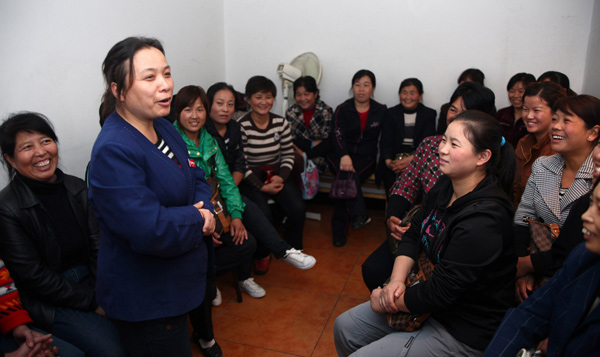Skilled workers
The responsibility of maternity and child care traditionally fall on the grandparents. However, young professionals are increasingly getting married and having children far away from their hometowns.
Risa Chen, who was raised in Tianjin, gave birth to her baby daughter in Beijing three months ago. The 34-year-old public relations officer, who is one of the 5 million migrant residents in the city, turned to domestic services companies instead of having her parents stay.
|
 Shu Weifang, a trainer with China Youth Home Service in Beijing, gives a class at the weekend to domestic helpers on how to communicate with their employers. Language skills are a major plus. [Feng Yongbin / China Daily]
Shu Weifang, a trainer with China Youth Home Service in Beijing, gives a class at the weekend to domestic helpers on how to communicate with their employers. Language skills are a major plus. [Feng Yongbin / China Daily] |
"I want professional care for myself and my baby girl," said Chen. "My helper is very good and she knows all there is to know about maternity nursing. It is totally worth it."
Chen said her parents supported her decision, and is now trawling the market for a teacher to help educate her child.
Nurse Shi Changcui, 34, has taken care of roughly 60 newborn babies and their mothers in towns and cities across China. She earns more than 8,800 yuan a month but said the salary does not come easily.
"I'm on 24-hour standby and I only get four to five hours sleep every day," said Shi, who hails from Shanxi province. Her diary is fully booked until the end of next year.
Among the many varied requirements of today's customers, the one that companies most struggle with is the desire for multi-lingual staff.
"A South African ambassador once called and asked for a domestic helper who is fluent in English and has experience working with children," said Deng Junke, manager of China Overseas Domestic Service Center in Beijing. "I couldn't find any one suitable for him."
The capital alone has some 106,000 foreign residents and more than 20 percent of Deng's customers are expatriates, most of whom require staff to speak English and have skill in Western cooking. The manager said this can pose a problem.
Wang Guohua, who was hired by an American family in Beijing to take care of their three children, said she almost lost her job due to her inability to understand English.
"I had just started in the job and the 4-year-old just wouldn't stop crying," recalled the 43-year-old. "She was mumbling about something but I couldn't understand so I decided to take her downstairs and ask for help from the compound's reception desk."
However, on the way she bumped into the mother in the elevator - who suspected Wang was trying to abduct the child.
"I almost quit," said Wang, horrified by the misunderstanding. "I eventually taught myself English by spending time talking with the family. Now the kids love me; not just because I can sing English songs but also because I cook macaroni with delicious Chinese ingredients."
Image problems
Since 2003, companies and social unions have attempted to meet the demand by recruiting domestic helpers from rural areas in the provinces of Hebei, Henan, Gansu, Sichuan, Hubei, Hunan, Anhui, Shandong and Liaoning.
Last year, the All-China Federation of Trade Unions alone helped more than 200,000 people find domestic services jobs in Beijing.
However, most are usually middle-aged women with families, who are more than happy to return home when job opportunities open up in their native provinces.
China Youth Home Service, one of the largest chains in China, carried out a training program after the devastating 2008 earthquake in Sichuan aimed at helping survivors find jobs.
"We trained thousands in two months and 1,289 workers successfully found jobs in Beijing," said CHSA chief Zhu Lei, who is also the chief executive of China Youth Home Service. "But they all went home in the next three months to work in the brickyards opened for the reconstruction work."
Because of these difficulties, well-educated graduates appear to be perfect solution to the boom in demand for domestic help. However, many people are still put off by the industry's "menial" image.
"Pride and strong self-esteem is a huge obstacle for (our) students," said Lu Xia, who teaches at Chongqing City Management College. "Although we try to help them accept the occupation, the pressure from their family is overwhelming."
Out of this year's 38 graduates, only three are actually working as domestic helpers.
Liu Yuanyuan is one of them. She works for an art dealer at his villa outside of Chongqing but has never revealed her real job to her family in Dianjiang, a nearby county.
"I told them I work in a company in the city," said the 20-year-old. "I don't think my parents would understand if I told them the truth."
Society still does not have enough tolerance toward graduates working as domestic workers, especially men, said Liao Kun, one of only two male students in the class to graduate this year.
"Would you feel comfortable letting a 20-something young man take care of your wife and baby by the bedside?" he asked. "Even if I'm ready, society is not ready for me."
Unable to find a job, Liao now works as a salesman for beauty care products.
To help companies keep up with demand for domestic workers, the central government has been offering financial support to the industry since September 2009, with eligible agencies able to collect subsidies of up to 1,500 yuan per employee.
Yet, standards are likely to improve unless attitudes in society change, said Xie Lihua, deputy editor-in-chief of China Women News, a national newspaper under the All-China Women's Federation.
"The profession of domestic helpers is generally looked down upon," she added. "That lack of respect in society is preventing high-level talents from entering the market."